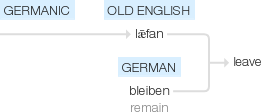Leave
Old English lǣfan ‘bequeath’, also ‘allow to remain, leave in place’ of Germanic origin; related to German bleiben ‘remain’.
wiktionary
From Middle English leven, from Old English lǣfan(“to leave”), from Proto-Germanic *laibijaną(“to let stay, leave”), causative of *lībaną(“to stay, remain”), from Proto-Indo-European *leyp-(“to stick; fat”). Cognate with Old Frisian lēva(“to leave”), Old Saxon lēvian, Old High German leiban(“to leave”), Old Norse leifa(“to leave over”) (whence Icelandic leifa(“to leave food uneaten”)), lifna(“to be left”) (whence Danish levne). More at lave, belive.
Formed in English by conversion ( anthimeria) of the transitive verb leave(“cause or allow to remain available”). Attested since the 19th century, with earliest references to billiards. [1]
From Middle English leve, from Old English lēaf(“permission, privilege”), from Proto-Germanic *laubō, *laubą(“permission, privilege, favour, worth”), from Proto-Indo-European *lewbʰ-(“to love, hold dear”). Cognate with obsolete German Laube(“permission”), Swedish lov(“permission”), Icelandic leyfi(“permission”). Related to Dutch verlof, German Erlaubnis. See also love.
From Middle English leven, from Old English līefan(“to allow, grant, concede; believe, trust, confide in”), from Proto-Germanic *laubijaną(“to allow, praise”), from Proto-Indo-European *lewbʰ-(“to love, hold dear”). Cognate with German lauben(“to allow, believe”), Icelandic leyfa(“to allow”).
From Middle English leven, from lef(“leaf”). More at leaf.
From French lever. Compare levy. [3] Compare also Middle English leve, a variant of levy that may have been monosyllabic. [4]
etymonline
leave (v.)
Old English læfan "to allow to remain in the same state or condition; to let remain, allow to survive; to have left (of a deceased person, in reference to heirs, etc.); to bequeath (a heritage)," from Proto-Germanic *laibjanan (source also of Old Frisian leva "to leave," Old Saxon farlebid "left over"), causative of *liban "remain" (source of Old English belifan, German bleiben, Gothic bileiban "to remain"), from PIE root *leip- "to stick, adhere."
The Germanic root seems to have had only the sense "remain, continue" (which was in Old English as well but has since become obsolete), which also is in Greek lipares "persevering, importunate." But this usually is regarded as a development from the primary PIE sense of "adhere, be sticky" (compare Lithuanian lipti, Old Church Slavonic lipet "to adhere," Greek lipos "grease," Sanskrit rip-/lip- "to smear, adhere to."
Originally a strong verb (past participle lifen), it early switched to a weak form. Meaning "go away, take one's departure, depart from; leave behind" (c. 1200) comes from notion of "leave behind" (as in to leave the earth "to die;" to leave the field "retreat"). From c. 1200 as "to stop, cease; give up, relinquish, abstain from having to do with; discontinue, come to an end;" also "to omit, neglect; to abandon, forsake, desert; divorce;" also "allow (someone) to go."
Colloquial use for "let, allow" is by 1840, said by OED to be chiefly American English. Not related to leave (n.). To leave out "omit" is from late 15c. To leave (something) alone is from c. 1400; to leave (something) be is from 1825. To leave (something/nothing) to be desired is from 1780. To leave it at that is from 1902. Leave off is from c. 1400 as "cease, desist" (transitive); early 15c. as "stop, make an end" (intransitive).
leave (n.)
"permission, liberty granted to do something," Old English leafe "leave, permission, licence," dative and accusative of leaf "permission," from Proto-Germanic *laubo (source also of Old Norse leyfi "permission," and, with prefix, Old Saxon orlof, Old Frisian orlof, German Urlaub "leave of absence"), from PIE root *leubh- "to care, desire, love," the original idea being "approval resulting from pleasure." It is a noun relative of lief "dear" (adj.); and compare belief. In the military sense, it is attested from 1771.
